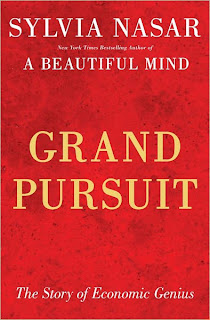A popular treatment of the emergence of political economics, as well as a discussion of the major unresolved issues still on the table today, such as the role of government in managing society versus the efficacy of the free market.
Nasar (Journalism/Columbia Graduate School; A Beautiful Mind: A Biography of John Forbes Nash, Jr., 1998) begins her examination of the evolution of modern society, and the attempt by leading intellectuals to understand and shape the process, with a look at the Victorian era and the writings of Karl Marx, John Stuart Mill, Thomas Malthus and others. This was a time when the question of how to improve the deplorable condition of the British working classes—illustrated by writers such as Charles Dickens, whom Nasar cites—was hotly debated, with Malthus blaming the depravity of the poor and Marx predicting revolution. The author references the less well-known but influential work of economist Alfred Marshall, a champion of universal education and technology who argued against the notion that philanthropy and political economy were at odds and that progress was not possible without revolution. Nasar acknowledges the Fabian society as the first think tank, although the word "connot[ing] the growing role of the expert to public policy making wasn't coined until World War II." At the turn of the century, it was influential in shaping public policy in the direction of social reform, attracting such notables as Winston Churchill, then a liberal, to its ranks. Nasar gives a gripping account of the devastation in Europe after World War I, and the conflict since over how to resolve cyclical economic crises such as the depression of the 1930s and the current recession.
This broad-sweep introduction adds an important historical dimension to current debates on the future of the American economy.
Killing Lincoln America
Library Journal -
O'Reilly, the popular and controversial cable news commentator, teams here with Dugard (Into Africa: The Epic Adventures of Stanley and Livingstone) to cover Lincoln
—Michael Farrell, Reformed Theological Seminary Lib.,Oviedo , FL
—Michael Farrell, Reformed Theological Seminary Lib.,
Thinking, Fast and Slow by Daniel Kahneman
Publishers Weekly –
The mind is a hilariously muddled compromise between incompatible modes of thought in this fascinating treatise by a giant in the field of decision research. Nobel-winning psychologist Kahneman (Attention and Effort) posits a brain governed by two clashing decision-making processes. The largely unconscious System 1, he contends, makes intuitive snap judgments based on emotion, memory, and hard-wired rules of thumb; the painfully conscious System 2 laboriously checks the facts and does the math, but is so "lazy" and distractible that it usually defers to System 1. Kahneman uses this scheme to frame a scintillating discussion of his findings in cognitive psychology and behavioral economics, and of the ingenious experiments that tease out the irrational, self-contradictory logics that underlie our choices. We learn why we mistake statistical noise for coherent patterns; why the stock-picking of well-paid investment advisers and the prognostications of pundits are worthless; why businessmen tend to be both absurdly overconfident and unwisely risk-averse; and why memory affects decision making in counterintuitive ways. Kahneman's primer adds to recent challenges to economic orthodoxies about rational actors and efficient markets; more than that, it's a lucid, marvelously readable guide to spotting—and correcting—our biased misunderstandings of the world.




No comments:
Post a Comment